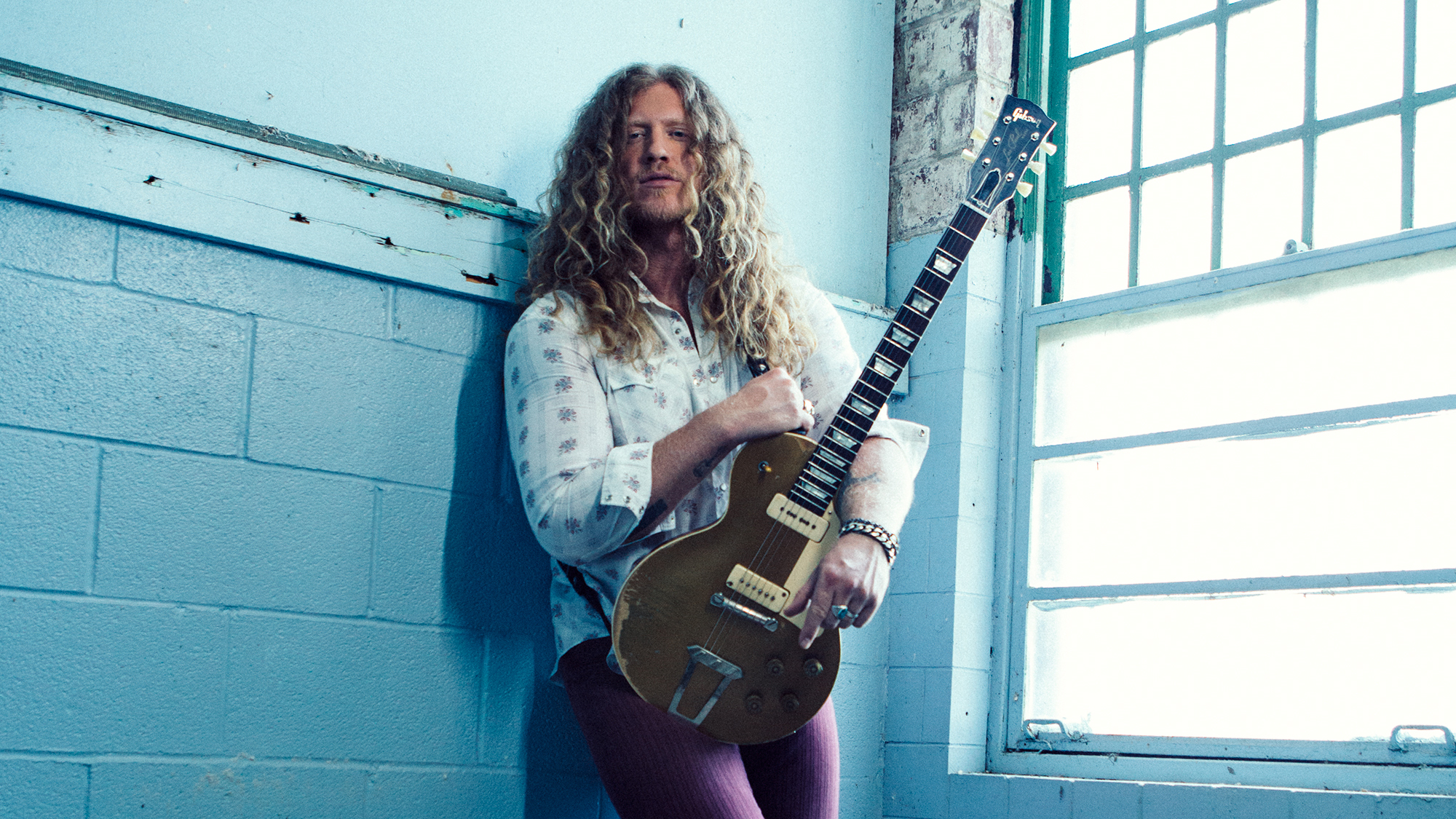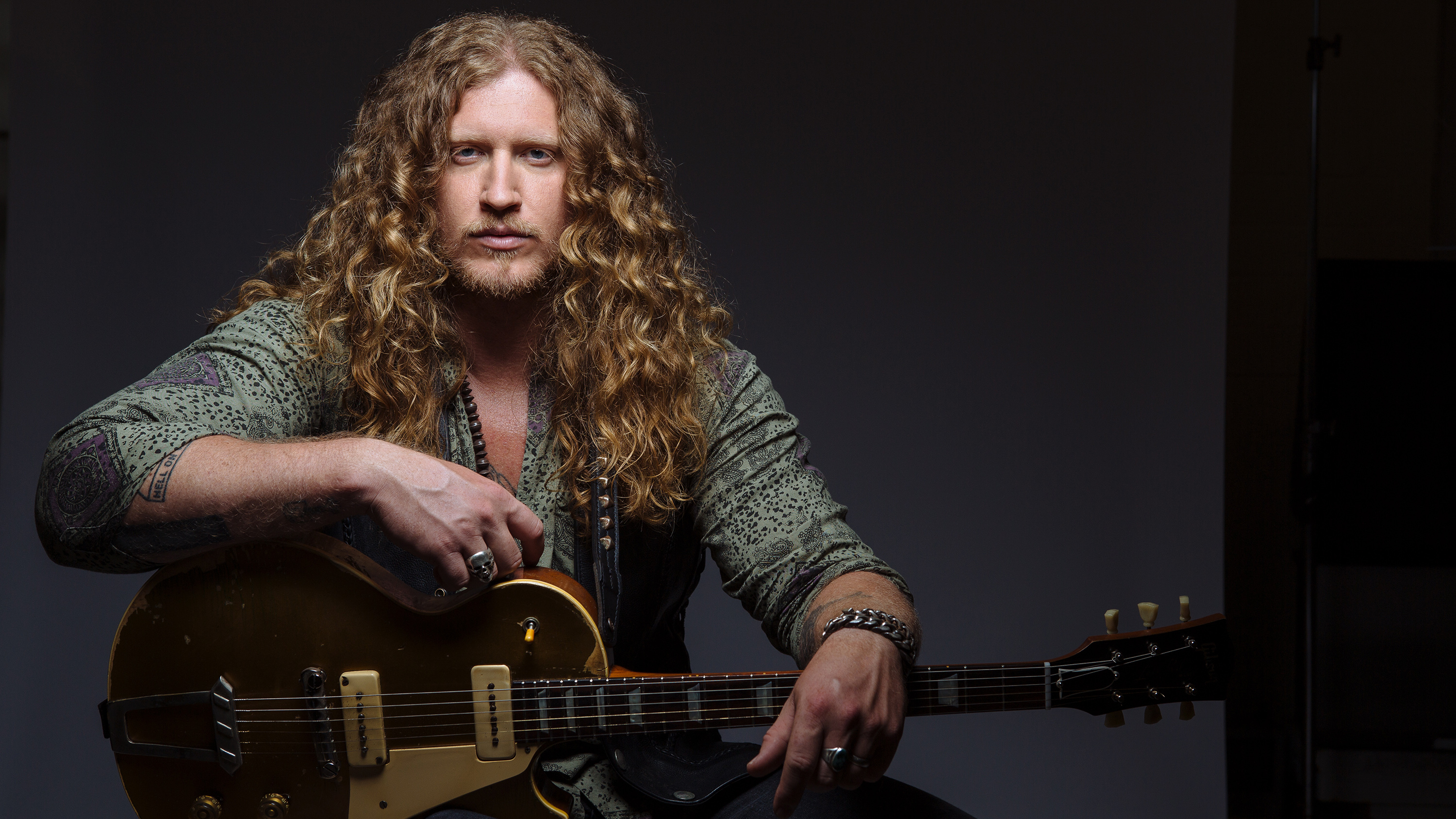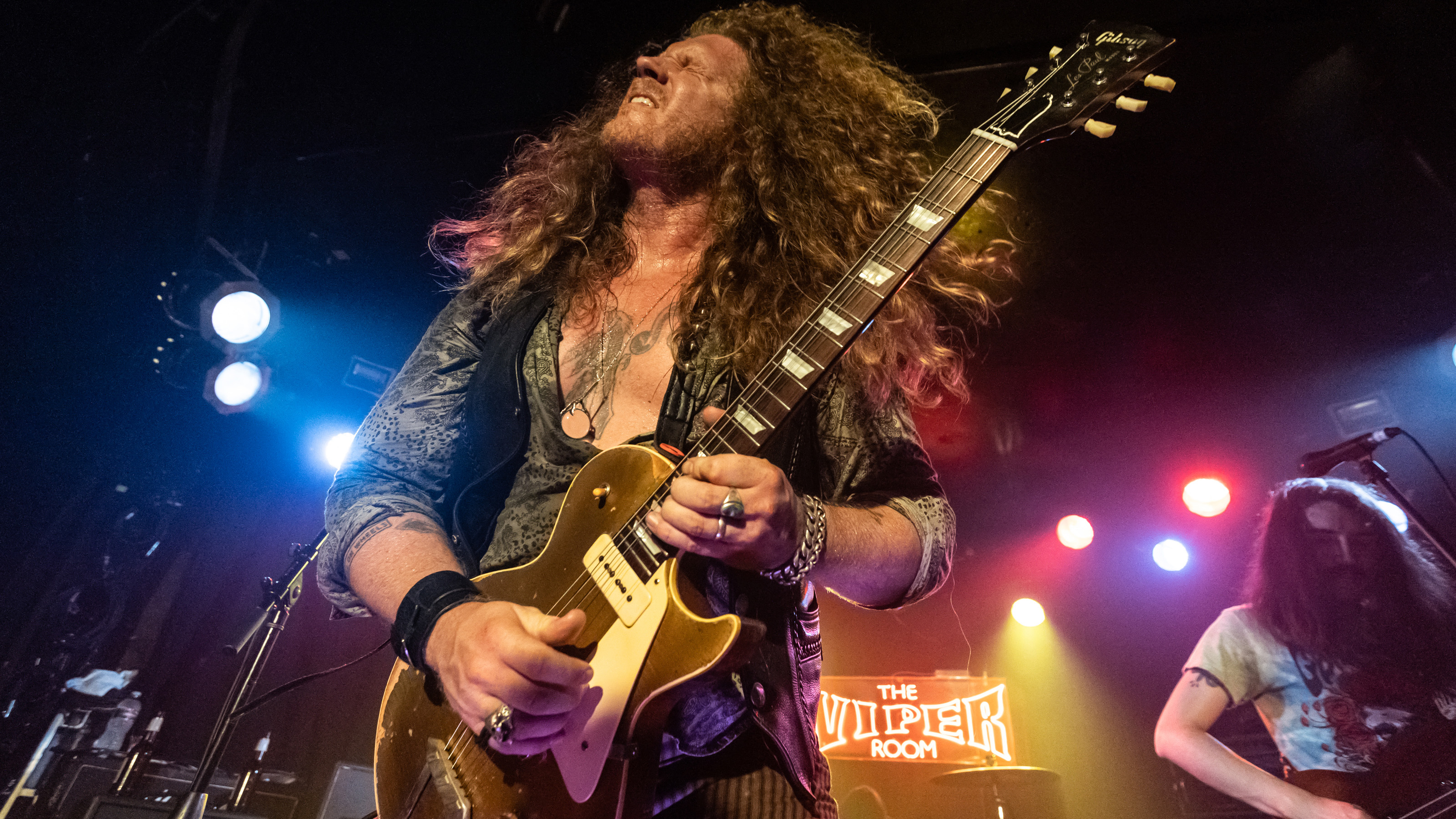"Aged 15, 16 and 17, I wanted to be Stevie Ray Vaughan – that’s all I cared about": Jared James Nichols on blues heroes, Zakk Wylde, Patsy Cline and the 10 albums that changed his life
"I had a Tube Screamer as well and I still use it"

Riding high on the release of his latest album, which came out in January via Black Hill Records, 2023 looks set to be a suitably big year for one of the biggest personalities in contemporary blues music.
While many artists choose the self-titled route for their debuts, Jared James Nichols saved the eponymous honour for this, his third studio album, and one which he describes as “a coming of age.”
“It’s self-titled because this is the first one that sets the bar for where I want to go,” he explains.
It feels like this was the first one where everything started to spark and I was in the sonic place I wanted to go
“I feel like I’ve been waiting in the wings. To get this record out and to finally be at this moment feels good. With the previous releases – although I love them and you are always growing as a musician – I feel like I was in growth mode and I was trying to figure it out, especially in the studio.”
“I always had a hard time delivering the sound in my head,” he adds. “With this record, I really found my voice as a songwriter, as a player and as a singer. It feels like this was the first one where everything started to spark and I was in the sonic place I wanted to go.”
Nichols’ slogan-come-mantra is – and has long been – 'Blues Power,' and the electrifying new LP doubles down on raw blues energy and sheer physical power in equal measure.
At 6 feet 5 inches tall and built like a tank, there’s no denying that there’s serious brawn involved in Nichols’ approach to the instrument, and a weighty mahogany slab of Les Paul can look confoundingly slight when being put through its paces by the larger-than-life guitarist.
Get the MusicRadar Newsletter
Want all the hottest music and gear news, reviews, deals, features and more, direct to your inbox? Sign up here.
During an intense recording session at Nashville’s legendary Blackbird Studios, the Gibson Ambassador pushed his collection of signature and vintage single-cuts to the limit to capture the dizzying heat - and frankly dangerous volume levels - that he and his band produced inside the storied chambers of Studio D.
“When we went in there, I was so reckless with my gear - but in the best way possible,” he smiles.

There was no point where I thought I’d better back it down, it was just full throttle!
The proud owner of a battered 1952 Les Paul that he’s affectionately named ‘Dorothy’ because it literally survived a tornado, Nichols makes something of an understatement when tells us that his “stuff is pretty heavily played”. But, his reported studio methods sound almost as unforgiving as another almighty clip round the ear from Mother Nature herself.
“I f****g blew speakers on the album. I had my amps all the way up. There was no point where I thought I’d better back it down, it was just full throttle!”
“I had those guitars leaning on the amps to get all those feedback moments,” he explains, pointing to a particularly wild, personal fave of a sonic capture on the record’s second track, Easy Come, Easy Go.”
“There’s a moment on there during the solo section where Dennis Holm, our drummer, went into a halftime feel and all of a sudden, we just went for it. There’s a point where I’m bowing to the amp, and I’m holding this note and it starts feeding back, but the whole guitar is shaking. I’m literally like a snake charmer!”
Channelling the spirit of the great ‘60s power trios as well as the rock and grunge behemoths of his teens, Nichols and his band set out not to capture note for note perfection, but rather the indescribable energy that only certain studio recordings possess - tracking all the instruments live to tape.
“There were elements that we weren’t totally satisfied with, but the core of it was so cool that we couldn’t try to redo it because we’d caught it!”
When I think about the guitar, it all comes from a bluesy place
Reflecting on the music that made him, he suggests: “When I think about the guitar, it all comes from a bluesy place. That’s the foundation. But I didn’t grow up in the ‘50s or the ‘60s. I grew up in the ‘90s with grunge and listening to heavier music, so I like to inject a lot of that into it.”
Dialling in from his Nashville home, we sat down with Mr. Blues Power himself for a whistle-stop tour of 10 formative records that, over the course of many years, have seeped into his musical psyche, steering him towards the landmark release of his own “statement piece” of a studio effort.

1. Patsy Cline - Showcase (1961)
"This is a greatest hits, but it’s an old greatest hits and it was my first love in music. No one would ever expect that, but when I was a little kid, my dad would drive around in the car and we had that on tape. I was little, so my voice was really high, and I would just sing it right up there!
"All of those songs, still to this day, I listen to and I love. Honestly, when I hear a really great vocalist, I’m inspired with the guitar - it’s the inflection in the voice. It’s almost like when you hear Over The Rainbow by Judy Garland, and there’s something about it that you can’t describe but it touches you. With Patsy Cline’s voice, I always had that. I just loved the timbre of her voice."
2. Santo & Johnny - Santo & Johnny (1959)
"Santo & Johnny have all these f*****g banger instrumentals like Sleepwalk, and the steel guitar player, Santo, again does a very vocal thing. When you hear him play, it’s so vocal and I think that’s why I like to bend strings so much - to try and do that, even in my own way.
"I think that’s my favourite thing about guitar and about music. I feel like it’s the gateway to the player when you hear a vibrato."
3. The Ventures - Walk, Don’t Run (1960)
"When I was first listening to all this stuff, I heard The Ventures’ Walk, Don’t Run, and they had another bunch of banger instrumentals, where it was all guitar stuff and surf guitar.
"When I first started to play, my first tab book was The Ventures. It was called Pipeline and it had all those songs, so I remember sitting there and listening to the CD, stopping it and trying to figure it all out, and it was kind of cool because those guys were f*****g great guitar players, and the way that they played was so cool.
"My parents weren’t musicians or anything, but my Mom would always listen to oldies, and I feel like my Dad had his finger a little bit more on the music. He was a greaser. He wore a white t-shirt with the Levi’s – the whole thing – his whole life. This was the music I feel like he listened to when he was a kid, so we would listen to that."
4. Black Sabbath - Paranoid (1970)
"The next big record would have to be Paranoid by Black Sabbath because that was when I started to get a little angsty and a little heavier.
"There was Paranoid and there was Alice In Chains’ Dirt, and I heard that because that was what was still on the radio in the late ‘90s. But Paranoid was a big one because I started to learn all those riffs."
5. Stevie Ray Vaughan and Double Trouble - Texas Flood (1983)
This record f******g blew my mind because Stevie plays the guitar with such a fluid style.
I grew up right down the street from where he died, and when I got into the guitar, everyone was like, “Oh dude, do you like Stevie?” and I didn’t really know. I got that CD and it was probably the equivalent of £3 at Walmart. I remember putting it on and being like, “whoah!” because it was right when I was dipping my finger into blues music, but he played like a guitar hero. He had the f*****g chops!
"Aged 15, 16 and 17, I wanted to be Stevie Ray Vaughan – that’s all I cared about. I had a Strat and I tried to make it look like Stevie’s. It’s f****d! It had a white pickguard so I just spray painted it black, and the funniest part - even when I was 16 years old - I wrote “Blues Power” right on the back. I had a Tube Screamer as well and I still use it."
6. Jimi Hendrix - Band of Gypsys (1970)
"Band of Gypsys was that live thing and it was so powerful. The thing about that record was the rhythm section, and those songs are so jammable.
"At that time, I could play songs like Machine Gun and Who Knows, figure them out and jam them with my friends. I just remember that I loved the energy of that album, and Hendrix’s playing on that was just so fucking good! I still listen to all this stuff – obviously – and I still think a lot of my favourite players are Strat guys."
7. Cream - Fresh Cream (1966)
I love English music and English blues. The Fleetwood Mac stuff, Robin Trower – there was so much good shit and so many great bands, but I loved the way Eric played on that Fresh Cream record, and I still love it.
There’s a song called Sleepy Time Time and there was something that really spoke to me about just how delicate but also stinging it is
"I remember hearing Cream when I was kid – Crossroads and stuff – but, when I heard Fresh Cream, I was already playing. I was probably 17 years old. I remember what I heard was another take on the blues I loved. I was getting this American thing with Stevie and the way he was playing blues, but then I heard Clapton at that time, and what he was playing on that record.
"There’s a song called Sleepy Time Time and there was something that really spoke to me about just how delicate but also stinging it is. Yet again, it was the touch, the tone.
"One of the qualities I like about players is when they’re not shoving it down your throat. When I hear Eric’s playing on that record, it’s effortless, it’s badass and he’s just playing all the right stuff at the right time. "
8. Mountain - Climbing! (1970)
"With Leslie West, it was kind of like when I found Stevie Ray Vaughan. I got into him when I was trying to put my trio together, and I was trying to figure out how I was going to play because – in a trio – there’s a lot of space. I felt like when I played a Strat and I was playing in a trio, I was trying to sound like someone else – I was trying to sound like Stevie or Jimi and I was trying to do that Strat blues thing. When I did that, I felt uninspired.
"When I picked up a Les Paul, there was more pump and more power to it, and I felt like I had a bigger reach.
Everyone who plays the guitar wants to be able to play perfectly, but with him, it was almost like he was a f*****g grizzly bear with a guitar
"I found Mountain and I was listening to Leslie West, and he’s not the most technical player, but there’s certain qualities about him that I love. The thing about it is the tone, his phrasing and his vibrato.
"The way he plays a riff, to me, is so disgustingly good! Everyone who plays the guitar wants to be able to play perfectly, but with him, it was almost like he was a f*****g grizzly bear with a guitar. Everything was chewy, and it was really aggressive – not aggressive like in metal – but it was pissed off, and there was something about that that spoke to me."
I started to dig more into his tone, and that’s why I got into P-90 Les Pauls, and the single pickup stuff - like my signature guitar - is because of him. I heard how much he could do with one pickup, and it’s almost like I reverse engineered my playing because of him.
9. Queens of The Stone Age - Songs For The Deaf (2002)
“I remember seeing this tour when I was a kid with Dave Grohl on drums. What I like about Songs For The Deaf is it’s modern, the production of it and the way it sounds is super cool, and I love the guitar parts - I think they’re really creative.
"Queens of The Stone Age are such a cool band. Their songs get stuck in your fucking head! It’s something I almost overlooked at the time, but now, when I come back to it, I’m like, “Man, I really like this,” and it’s music I like to listen to when I exercise."
10. Pride & Glory - Pride & Glory (1994)
"Zakk Wylde had a band in the early ‘90s called Pride & Glory and this record was huge for me.
"When I heard it, it was before I moved to LA., so it was around 2011. I remember I was at a CD store, and this is the only time this has ever happened to me. It was one of those shops where they sold hippy stuff and used CDs. It was the only time I ever went there, I walked in and I was looking at CDs, and I saw a CD that said ‘Pride & Glory’. There were rows of CDs, and I look at it, and it’s got cows on the cover and a dilapidated barn, and I’m like, 'What is this?' I flip it over and see that it says, 'Guitars – Zakk Wylde,' so I bought it for like, two dollars.
I think that’s a record – honestly – that for my new record, maybe is an influence
"I put it on in the car and it was some heavy ass Southern rock. I listened to that for probably a year straight. I always tell Zakk because Zakk’s like my estranged father and I f*****g love that dude!
"That record was huge because it has really cool tracks, as well as the playing and the energy. I think that’s a record – honestly – that for my new record, maybe is an influence. It’s not so much the way that it’s recorded, but the energy because I know those guys were playing that stuff live.
"There’s no holding back and there’s just something about it that goes further than the limit of where you think it should."
- Jared James Nichols will be traversing the Atlantic to bust speakers and eardrums alike at London’s legendary The Black Heart on Wednesday 22 February. Tickets for the show are available now at: seetickets.com
Ellie started dabbling with guitars around the age of seven, then started writing about them roughly two decades later. She has a particular fascination with alternate tunings, is forever hunting for the perfect slide for the smaller-handed guitarist, and derives a sadistic pleasure from bothering her drummer mates with a preference for “f**king wonky” time signatures.
As well as freelancing for MusicRadar, Total Guitar and GuitarWorld.com, she’s an events marketing pro and one of the Directors of a community-owned venue in Bath, UK.
"Reggae is more freeform than the blues. But more important, reggae is for everyone": Bob Marley and the Wailers' Catch a Fire, track-by-track
“Part of a beautiful American tradition”: A music theory expert explains the country roots of Beyoncé’s Texas Hold ‘Em, and why it also owes a debt to the blues





















